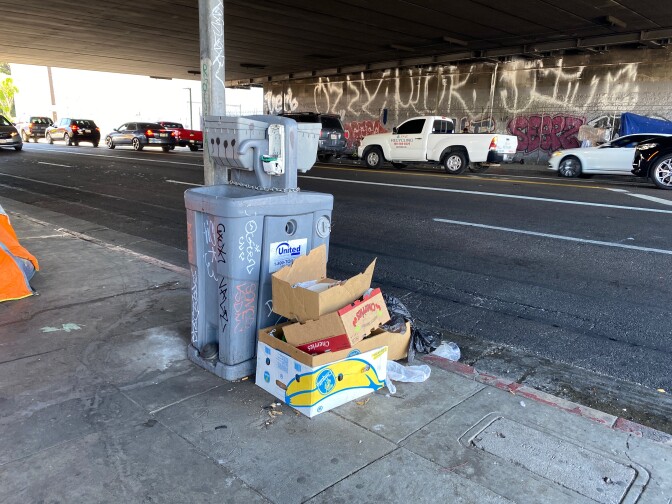This story is free to read because readers choose to support LAist. If you find value in independent local reporting, make a donation to power our newsroom today.
LA City Council To Consider Reinstating Porta Potties For Unhoused Angelenos

Porta potties have slowly disappeared from the city in recent months. But that could change soon.
At a city council meeting Wednesday, council member Mark Ridley-Thomas introduced a motion that would return 150 hygiene stations to the streets of Los Angeles and establish shower programs at seven YMCA locations until the end of the year. The motion is headed to the Homelessness and Poverty committee to iron out details before it is put on the council agenda for a vote.
The portable toilets were part of a pilot program that ended earlier this summer.
Willie Smith, a.k.a. Bishop Enoch, a former drug counselor who was unhoused on-and-off for 25 years, said the city made a big mistake removing porta potties to begin with.
“People will go back to defecating and urinating in alleys, wherever they can,” he said.
The total cost of the hand washing stations and portable restroom rentals that were part of the city’s pandemic response from March, 2020 to June, 2021 was $4.18 million. There were originally 363 hand washing stations and 182 portable toilets.
Ridley-Thomas is asking the council for roughly $1.2 million in funding for the hygiene stations and showers, adding that extending the programs is “essential” for people experiencing homelessness as the pandemic continues. He also wants the city administrative officer to come up with a long-term hygiene plan within 90 days.
Ariana Drummond, deputy for communications and civic engagement for Ridley-Thomas, said each council office will work with the Mayor's Office of City Homeless Initiatives to prioritize locations. She added each site will have a bathroom with sink, an Americans with Disabilities Act (ADA) compliant bathroom, and one hand washing station.
Unhoused people who live on lawns and sidewalks around the city all agree on one thing: removal of the hygiene stations has had devastating consequences on their quality of life and mental health.
“If I have to take my number two, I go behind the wall and do it 'cuz I have no option.”
Chukwuenemeka Ekulide, a 33-year-old unhoused man who sleeps in the park surrounding City Hall, said out of his concern for the trees, he will urinate in a bottle when there are no bathrooms available and pour it into the street.
“If I have to take my number two, I go behind the wall and do it cuz I have no option,” he said, adding he would be grateful if the city returns the porta potties for people who are less privileged, such as himself.
“They’re disgusting”
Jesus Gonzales, an unhoused person in downtown, said the portable hygiene stations he saw were “disgusting.”
“I dare you to try to go in one,” he said. “Take a picture, post it on the Internet, and show everyone the real porta potties.”
Each unhoused person interviewed about the hygiene stations’ possible return had less than stellar reviews about their maintenance, overseen by the city’s General Services Department. Reporting by LA Taco discovered that vendors failed to regularly service the units despite charging the city millions of dollars.

Harrison Wollman, press secretary for Mayor Eric Garcetti, said the city engaged with vendors to improve the conditions of hygiene stations and, going forward, will ask contractors for daily service reports of their efforts to clean and service all stations.
Vendors responsible for their upkeep included United Sites, which received roughly $2.7 million, and Andy Gump, who billed nearly $1.2 million to the city, according to Brian Swanson of the General Services Department. Swanson said some hygiene stations were removed due to vandalism, theft and graffiti, and that nearly 270 units were damaged or replaced throughout the program.
Peter Woolf, a 59-year-old unhoused man who has lived in Los Angeles since 1981, said he heard rumors that the portable bathrooms were removed due to rampant drug use and sales.
“But the people who do drugs, mess it up for us,” Woolf said. “I don’t drink, I don’t do drugs, I got health issues, I’m on medication. So I need a place where I can use the bathroom.”
Woolf said when the restrooms at the Los Angeles Mall across from City Hall are closed, he relies on the kindness of businesses in Little Tokyo who have made “arrangements” with people experiencing homelessness.
Although many businesses don’t allow people to use their restrooms unless they are paying customers, Woolf said as long as he agrees not to panhandle out front, they allow him to come in.
Gonzales said despite being unhoused, people experiencing homelessness are good people who deserve better from the city.
“At least give us a porta potty and a good shower every night, for god’s sake, if you’re not going to give us a place to live,” Gonzales said. “Do you know how embarrassing it is to do what you have to do, and have nowhere to go? It just lowers your soul and depresses you.”







